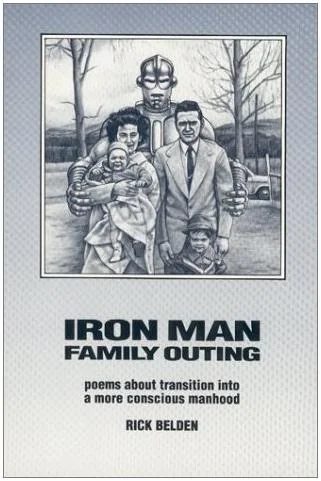Iron Man Family Outing: Poems about a transition into a more conscious manhood by Rick Belden is a candid, often raw collection that charts one man’s attempt to understand the legacy of a difficult childhood and become a healthier adult. Belden writes about a father he experienced as “angry” and “unavailable,” and how an idealized comic-book hero—Iron Man—became both shield and mirror as he grew up. The result is a poetic memoir of healing that will resonate with readers exploring how early experiences shape adult life.
What the book does well
Belden’s poems move between memory and insight, showing how the “damaged child” within can fuel adult patterns—numbing, isolation, or acting out—until those wounds are faced. The language is direct and unadorned, which makes the material accessible even when the subject matter is painful. For readers who have lived with anger, aggression and abuse in their families, the book offers recognition without sensationalism and points toward responsibility and repair.
Key themes
- Father–son wounds: How inconsistent or harsh parenting can echo through adult relationships.
- Protective personas: The “Iron Man” mask as a survival strategy—and why it eventually must be set down.
- Integration: Befriending the younger self rather than denying him, so that grief and anger can be processed instead of repeated.
Context and evidence
The book is memoir and poetry rather than clinical text, but its arc aligns with research on early adversity and adult health. For a concise overview, see the CDC’s summary of Adverse Childhood Experiences (ACEs), which outlines how childhood stressors can affect mental and physical outcomes across the lifespan.
Practical takeaways
Belden’s work suggests that insight must be paired with action. Readers looking for next steps might consider structured self-help or therapy. For mild, recent difficulties, guided programs like computerised CBT can be a useful starting point. Many also find a simple, steady mindfulness routine helpful; this simple meditation technique is an approachable option to build awareness and calm between therapy sessions.
Who should read this
If you’re interested in men’s inner lives, intergenerational patterns, or the language of recovery, this collection provides an honest companion. It’s not a step-by-step manual; it’s a mirror and a map—one that acknowledges pain while insisting on the possibility of growth.
Bottom line
Iron Man Family Outing is ultimately hopeful: by facing the child we were with clarity and compassion, we make space for the adult we want to become.

